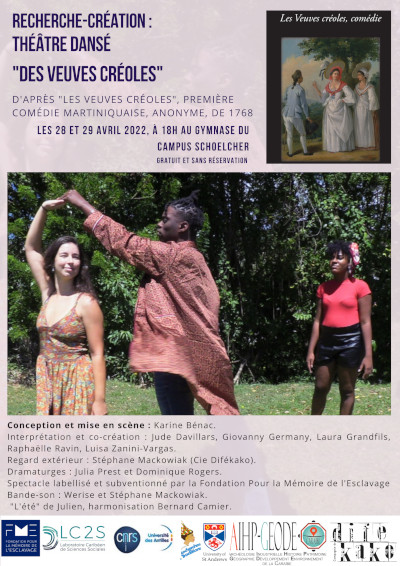Colonial-era theatre today
 This project is underpinned by Julia Prest’s work on colonial-era theatre in the ‘French’ Caribbean, notably Martinique and Saint-Domingue (present-day Haiti). It involves collaborations with theatre-makers, students, technicians and teachers in Scotland and the Caribbean, and its goals are to make the (hi)story of colonial-era Caribbean theatre more widely known and better-understood and, crucially, to explore how to bring that (hi)story to new publics today.
This project is underpinned by Julia Prest’s work on colonial-era theatre in the ‘French’ Caribbean, notably Martinique and Saint-Domingue (present-day Haiti). It involves collaborations with theatre-makers, students, technicians and teachers in Scotland and the Caribbean, and its goals are to make the (hi)story of colonial-era Caribbean theatre more widely known and better-understood and, crucially, to explore how to bring that (hi)story to new publics today.
The project has led to the creation of two new works to date. First, the one-woman show, Placeholder, written by the emerging Scottish-Jamaican actor and playwright, Catherine Bisset, in a production directed by Flavia d’Avila with Jaïrus Obayomi as dramaturg. Placeholder, which revisits the story of a historical performer of colour in Saint-Domingue called Minette, was premiered at the Scottish Storytelling Centre in Edinburgh in November 2021 as part of the Being Human Festival before going to the Byre Theatre, St Andrews in February 2022. Placeholder has been nominated for several drama awards including the Alfred Fagon Award for Black British Playwrights, and a new version in British Sign Language is in preparation.
The second new work is an adaptation of the anonymous comedy, Les Veuves créoles (the Creole Widows) – the first play known to have been composed in Martinique, which has resurfaced thanks to Julia Prest’s critical edition (MHRA 2017). The adaptation, called Des Veuves créoles (From the Creole Widows) emerged from a creative research project led by Dr Karine Bénac at the Université des Antilles, Martinique, featuring students and schoolteachers, with Julia Prest as dramaturg. Des Veuves créoles was premiered in Martinique in April 2022 and a visit to Scotland is in preparation. A broader virtual reality project around Les Veuves créoles is also underway.